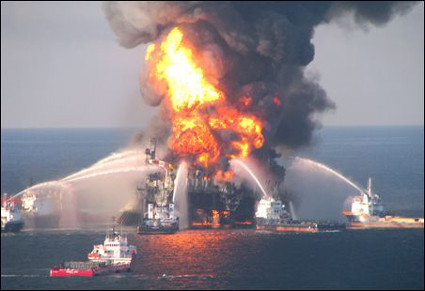Getting past disaster.
The story of the deepwater oil rig in the Gulf of Mexico that caught fire and sank in an explosion following a blowout on April 20, taking 11 souls with it, continues to get worse. It is estimated today that the well, located in 5,000 feet of water, is leaking at the rate of 5,000 barrels per day. Efforts to cap the well using robotic undersea technology and other means have been unsuccessful.
There is now a giant slick on the surface of the Gulf that is approximately 100 miles long by 45 miles wide.
That slick is making landfall at Louisiana as this piece goes to air and Governor Bobby Jindal has declared a state of emergency. At risk are commercial fishing, tourism and coastal marine and animal life together with beaches and coastal vegetation.
If the flow of oil from the damaged well cannot be stopped, it is likely that large numbers of people, businesses, animals and landowners will be affected.
The story is developing and much remains to be seen. This accident could be a very bad one with very real economic and human consequences. I say this as a statement of the obvious but also as a disclaimer for what I am about to say concerning this tragedy.
Get ready for the legion of talking heads as they offer this disaster up as renewed proof of our need to “end our addiction to oil.” Look for pundits on the Sunday shows telling you that this makes the case for the need to develop “green” energy technologies. Watch as President Obama backs off of his recent statements concerning allowing the expansion of offshore oil exploration.
On Tuesday, House Energy and Commerce Committee chairman Henry Waxman (D-CA) sent a letter to British Petroleum, the owner of the well and Transocean, LTD, the owner of the rig, expressing “concern” and asking the companies to explain what they knew about the risks of drilling at the site. Congressional hearings, the Americanized form of Japanese Kabuki theater, will follow shortly.
Expect an avalanche of proposals for “tough new regulations on offshore drilling so that a disaster like this can never happen again.”
In other words, get ready for the usual torrent of words, hysteria, political grandstanding and media histrionics that have gradually but relentlessly pushed aside common sense and shared purpose as the foundation of American policy.
First, we’re not going to quit using hydrocarbons. The world uses the equivalent of 200 million barrels of oil per day, or the output of approximately 23.5 Saudi Arabias. Every day. You’re not going to get 23.5 Saudi Arabias per day out of wind farms and solar cells. In our lifetimes and in the lifetimes of our children, oil will be the major component of the world energy matrix.
Second, British Petroleum and Transocean knew what they knew about the risks of exploring for oil in 5,000 feet of water and now they know more. What no one is ever going to say is that BP and others are out there in those depths, pushing the exploration technology envelope, because governments – and particularly our government – have refused to allow drilling in less risky locales. (Does anyone remember the Arctic National Wildlife Refuge (ANWR)? They won’t let us drill in ANWR. So we’re out in the middle of the ocean instead.)
Third, another barge load of regulations will provide copy for campaign TV ads but will do little for energy exploration safety. The rig that was lost in this disaster will cost $700 million to replace. British Petroleum has billions of its own money invested in finding and completing the well that just blew out.
Does any serious observer think that BP and the rig operator were out in the Gulf of Mexico like a bunch of drunken cowboys mindlessly taking crazy risks when they had billions of dollars of their own money on the line? I’m sure mistakes were made. But do you really believe that the fear of some arcane federal regulation will do for safety what the fear of losing billions of dollars did not?
Let me restate. No one is minimizing this accident. No one is saying don’t investigate it and learn from it. If mistakes were made, they require correction.
I’m just saying that my parents, born of the Depression and matured in World War II, would have gotten past this disaster quicker and more soberly than we’re going to.
And that’s why they were able to leave us the wealth that they did.









I echo the Congratulations on your media honors; very well deserved indeed! Always look forward to your topics and the…
I voted for Ross Perot...TWICE! Because he was a BUSINESS MAN I have always believed that this Country should be…
Spot on! And, congratulations on your well-deserved spot among media hosts in America.
7/10/25 Mr. Gleiser, Thank you for your excellent editorials and being added to the Top100 group. This in itself is…
I just had an epiphany! The reason the Liberal Left Democrats voted for Joe Biden is because they knew, without…